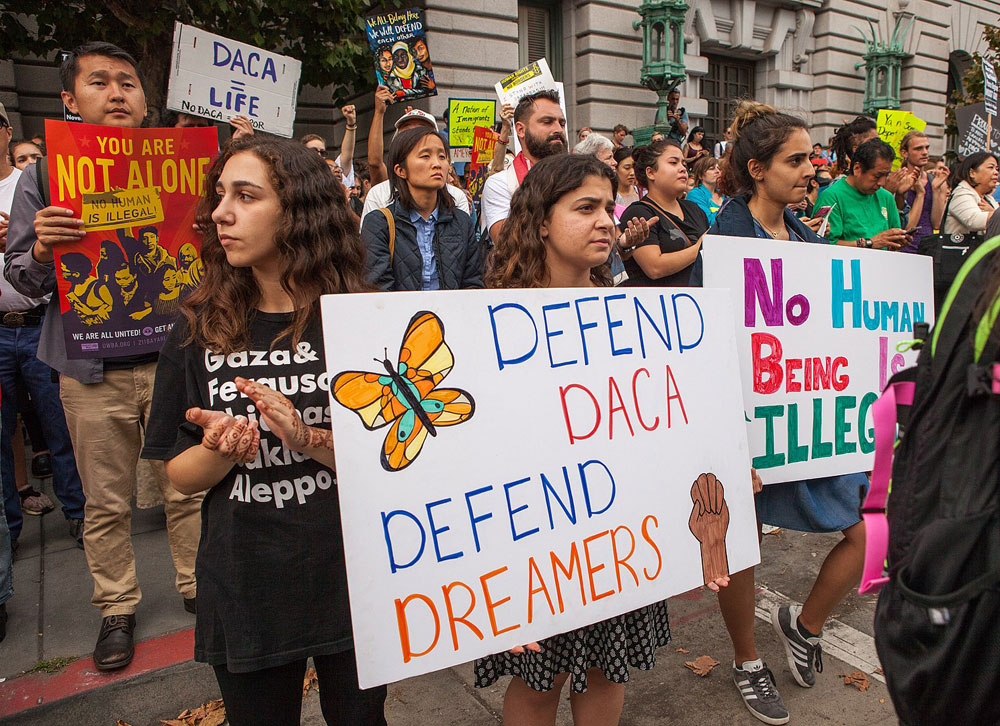
November 14, 2019; Chicago Tribune, New York Times, and NPR
The plaintiffs held hands triumphantly on the steps of the US Supreme Court after their hearing on November 12, 2019. Not just a few, but a huge number of young people standing, smiling, and listening to the cheers of the many who stood outside the Court building with signs and banners to cheer them on.
These were the DACA (Deferred Action for Childhood Arrivals) plaintiffs, representing over 700,000 undocumented young people brought to the US as children who were enrolled in this program. The DACA program began in 2012 under President Obama as an administrative action to protect these youth from deportation. These “Dreamers” could legally work and go to school if they met certain requirements and passed a background check. It was not, however, a path to citizenship. Under the Trump administration, Dreamers were told they would be protected, but later they were told the program was illegal and would be done away with. And so, on this particular Tuesday in November, the fate of DACA was handed to the US Supreme Court justices to determine. And most who heard the arguments inside the court are not optimistic.
As the Court began its session, President Trump tweeted, “Many of the people in DACA, no longer very young, are far from ‘angels’. Some are very tough, hardened criminals.” To the contrary, though, applicants actually cannot be a part of DACA if they have a criminal record and they must meet very strict requirements to participate. What’s more, research from the data collected on Dreamers by the Center for American Progress (CAP) cites their many contributions to the economy and the world of work:
Each year, DACA recipients also make major fiscal contributions to the economy. According to the CAP analysis of ACS microdata, DACA recipients and their households pay $5.7 billion in federal taxes and $3.1 billion in state and local taxes annually. In addition to this, DACA recipients boost Social Security and Medicare through payroll taxes. DACA recipients and their households hold a combined $24.1 billion in spending power—or income remaining after paying taxes—each year.
These are the “tough, hardened criminals” that the Trump administration seeks to put on deportation lists.
Sign up for our free newsletters
Subscribe to NPQ's newsletters to have our top stories delivered directly to your inbox.
By signing up, you agree to our privacy policy and terms of use, and to receive messages from NPQ and our partners.
The Court has some options in this case, but it seems unlikely to err on the side of DACA. Indeed, it seems possible the Court will move to overrule three federal appeals court panels and determine that the DACA program is illegal and unconstitutional, as the administration claims.
In his argument before the court, Solicitor General Noel Francisco, speaking for the administration, told the Justices that they really do not have the authority to even review the DACA policy change. This is because DACA is a discretionary program from the Obama administration in which they used “prosecutorial discretion” to defer deportations for a specific qualified group of people…in this case, Dreamers.
Many nonprofits are bracing for an unfavorable Court decision. Immigrant advocacy groups say they’re ready to roll out resources in case the court rules against DACA recipients.
“We don’t know exactly what a ruling from the Court would mean,” says Fred Tsao, senior policy council for the Illinois Coalition for Immigrant and Refugee Rights. Tsao says his group has been preparing informational resources, including online presentations and referrals to legal service providers, in case the Court rules against DACA. One of the services helps DACA business owners transfer ownership to a US citizen to run the company on their behalf. Tsao says, “If a business is incorporated, it could survive the loss of the immigration status of its business owner.”
The case, and the fate of the 700,000 DACA recipients, now rests in the hands of nine justices. Can this nation afford to lose these young people who truly want to contribute to this country—to say nothing about the moral disgrace of such a mass expulsion? So we all wait…some more nervously than others.—Carole Levine













